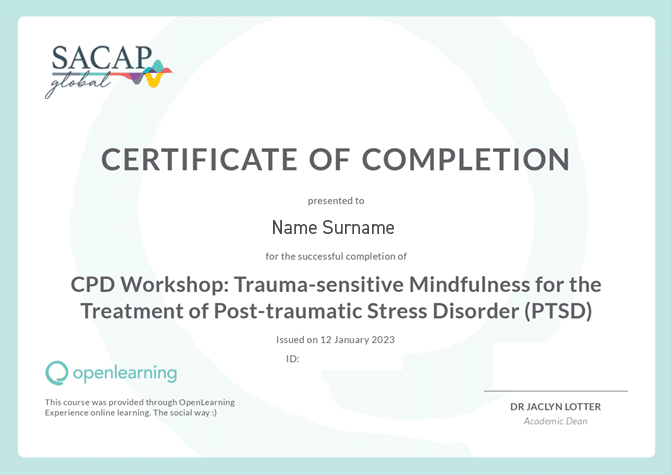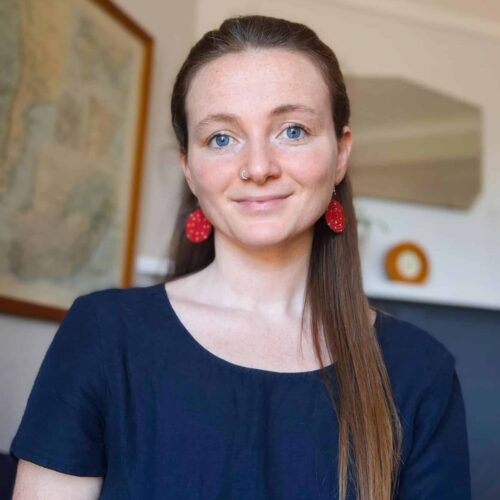Trauma-sensitive Mindfulness for the Treatment of PTSD
R450.00

Workshop Overview
Trauma-sensitive mindfulness (TSM) is an adapted approach to mindfulness that prioritizes safety and stability for individuals who have experienced trauma, ensuring practices do not overwhelm or re-traumatize them. It incorporates gentle, choice-based techniques to support healing.
The Trauma-sensitive Mindfulness for the Treatment of Post-traumatic Stress Disorder (PTSD) workshop is designed for anyone wanting to gain deeper insight into trauma, its impact on the nervous system, and the role of mindfulness in healing. The workshop is particularly valuable for psychologists and mental health practitioners.
This workshop provides a practical and accessible introduction to trauma-sensitive mindfulness, explaining how it can be used as a supportive approach for individuals experiencing PTSD.
PTSD is examined within both South African and global contexts, with a specific focus on trauma resulting from war, displacement, and other life-altering experiences. Key concepts such as polyvagal theory and Buddhist psychology are explored to provide a comprehensive understanding of how trauma affects the mind and body.
Ethical considerations are explored in relation to cross-cultural applications of mindfulness-based interventions, ensuring that participants gain a well-rounded understanding of how these techniques can be applied in different contexts.
The workshop will help learners gain a better understanding of what it means to be a trauma-informed practitioner and the importance of professional training in this field.
FAQs
What are the entry requirements?
Anyone 18 years of age or older can sign up for this online workshop. There are no academic entry requirements or conditions.
Is this workshop for you?
This online workshop is for you if you are interested learning more about trauma-sensitive mindfulness.
What is the time commitment?
A total of 3 hours is required to complete the workshop.
What do you need to do the workshop?
- Access to Microsoft Word
- Google Chrome (recommended)
- Stable internet connection
Is the workshop assessed?
Learners are required to complete an assessment comprising of reading a journal article and answering a 15-question multiple choice questionnaire.
Is the workshop accredited?
The online workshop is accredited by the Health Professions Council of South Africa (HPCSA).
What is trauma-sensitive mindfulness?
Trauma-informed mindfulness can help disrupt cycles of dissociation. It connects thoughts, feelings, and physical symptoms. This connection allows individuals to stay grounded in the present moment and improves self-regulation. Read more here.
What can you do after completing this workshop?
HPCSA registered professionals will receive 3 CPD points [3 CEU Continuing Education Units points] upon successful completion of the workshop.
Course highlights

-
Understand the impact of trauma on the individual.
-
Explore Buddhist Psychology and trauma-informed interventions.
-
Develop an understanding of ethical considerations for cross-cultural application of interventions.
Dates and Registration
Class of 2025: on demand
Participants can register at any time and move through the workshop content. Watch the live workshop recording and complete the online journal articles and multiple-choice questionnaire.
NOTE: HPCSA registered professionals who want to claim 3 CPD points [3 CEU Continuing Education Units points] need to complete the online assessment within 5 days after registering.
Learner Experience
Certification
This CPD workshop has been designed for psychologists to recognise and understand treatment of post-traumatic stress disorder (PTSD). Once you have completed the course, you will receive a digital certificate of completion.

The certificate serves as evidence of your new skills and knowledge and can be used to demonstrate your commitment to professional development.
Attend a live online session, or watch the recording, and complete an online reading and assessment.
HPCSA registered professionals will receive 3 CPD points [3 CEU Continuing Education Units points] upon successful completion of the workshop.
Workshop Overview
- Introduction: “The body keeps the score” by Bessel van der Kolk
- Understanding Trauma and Post-Traumatic Stress Disorder (PTSD), PTSD & the polyvagal theory
- Trauma-sensitive mindfulness (TSM) Buddhist Psychology: Suffering/PTSD and PTSD in the South African context
- PTSD in the global context – war-traumatised refugees
- Ethical considerations for cross-cultural application of interventions
- Trauma-informed practitioners: Professional training and qualifications
Learning Outcomes
By the end of the workshop you will:
- Understand the impact of trauma on the individual.
- Build knowledge of the clinical picture of PTSD.
- Develop insight into the difference between trauma and PTSD.
- Develop awareness of the polyvagal theory.
- Understand Porge’s polyvagal theory and mindfulness.
- Explore Buddhist psychology and trauma-informed interventions.
- Develop insight into Buddhist psychology, PTSD and diversity.
- Understand what trauma-sensitive mindfulness is and how it works.
- Examine PTSD within the SA context.
- Explore the use of trauma-sensitive mindfulness for the treatment of Post-Traumatic Stress Disorder (PTSD) for war-traumatised refugees.
- Develop an understanding of ethical considerations for cross-cultural application of interventions.
- Learn about trauma-informed practitioners’ professional training and qualifications.
- Develop an understanding of Ethical considerations for cross cultural application of interventions.
- Learn about Trauma informed practitioners: Professional training and qualifications.
Workshop Presenter

Dr Laila Jeebodh-Desai is an educational psychologist, lecturer and humanitarian. She works at St Peter’s College, where she provides psycho-educational assessments and therapeutic interventions. These interventions include mindfulness-based practices, narrative therapy, solution-focused brief therapy and other blended techniques.
Laila has been a practising lecturer at the South African College of Applied Psychology in Johannesburg since 2016. She has experience working with special needs children, many of which are diagnosed with Autism Spectrum Disorder (ASD), as well as Attention Deficit Hyperactivity Disorder (ADHD) and Pervasive Developmental Disorder (PDD).
Dr Jeebodh-Desai is a diverse South African female who is passionate about mindfulness practices. She is also a member of the Institute of Mindfulness in South Africa (IMISA).
The Team
The SACAP Global team brings a wealth of knowledge and practical experience across various disciplines. Our expert short course developers and dedicated support team are passionate about sharing their insights to help you get the most out of your online learning journey.
























